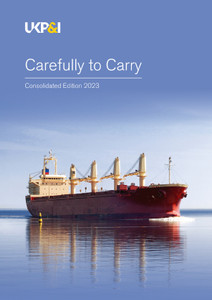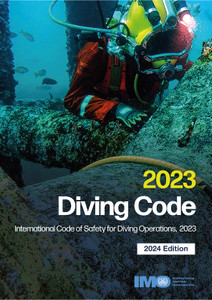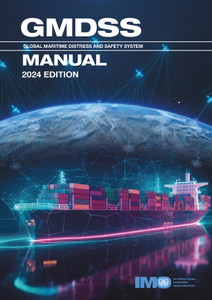
NAVTEX is an international automated direct-printing service for promulgation of maritime safety information such as navigational warnings and meteorological information to ships. It is a principle method for broadcasting maritime safety information, and search and rescue alerts when there is an incident, in accordance with the provisions of the International Convention for the Safety of Life at Sea, 1974. It has been developed to provide a low-cost, simple and automated means of receiving maritime safety information on board ships at sea and in coastal waters. This edition includes, in particular, the procedure to withdraw existing NAVTEX stations, should a coastal State decide to do so.
This Manual is intended for use by maritime Administrations, seafarers, shipowners and others concerned with preparing, broadcasting and receiving maritime safety information. The 2023 edition of the Manual came into effect on 1 January 2023 and includes the revised Performance standards for the reception of maritime safety information and search and rescue related information by MF (NAVTEX) and HF (resolution MSC.508(105)) and the revised Criteria for use when providing a NAVTEX service (resolution MSC.509(105), annex 4).
SOLAS regulation IV/12.2 states that ?Every ship, while at sea, shall maintain a radio watch for broadcasts of maritime safety information on the appropriate frequency or frequencies on which such information is broadcast for the area in which the ship is navigating.?
At the request of the IMO Sub-Committee on Radiocommunications, the NAVTEX Manual was first produced in 1988. Three subsequent editions have been produced, with the fourth edition published in 2005 containing amendments endorsed by the Maritime Safety Committee (MSC) at its seventy-eighth session in May 2004 by MSC/Circ.1122.
At its seventh meeting in September 2005, the International Hydrographic Organization (IHO) Commission on the Promulgation of Radio Navigational Warnings (CPRNW)* established a working group to review all World[1]Wide Navigational Warning Service (WWNWS) documentation. The working group included representation from the World Meteorological Organization (WMO) and firstly prepared revisions to resolutions A.705(17) on Promulgation of maritime safety information and A.706(17) on World-Wide Navigational Warning Service. The proposed revisions of these resolutions were circulated to IHO Member States under International Hydrographic Bureau (IHB) CL 104/2007, endorsed by the Sub-Committee on Radiocommunications and Search and Rescue (COMSAR) at its twelfth session in April 2008 and subsequently approved by MSC 85 in November/December 2008 by means of MSC.1/Circ.1287 and MSC.1/Circ.1288, respectively.
The IHO CPRNW Working Group then prepared the revised Joint IMO/IHO/WMO Manual on Maritime Safety Information incorporating the revised information from resolutions A.705(17), as amended, and A.706(17), as amended. The revised text was circulated to IHO Member States under cover of IHB CL 70/2008, endorsed by COMSAR 13 in January 2009 and subsequently approved by MSC 86 in May/June 2009 by means of MSC.1/Circ.1310. The working group subsequently prepared the third revision of the International SafetyNET Manual. The revised text of the International SafetyNET Manual was circulated to IHO Member States under cover of IHB CL 68/2009, endorsed by COMSAR 14 in March 2010 and approved by MSC 87 in May 2010 by MSC.1/Circ.1364.
Continuing with the holistic approach of reviewing all maritime safety information documents from the top down, the working group prepared the fifth revision of the NAVTEX Manual. The revised text of the NAVTEX Manual was circulated to the IHO Member States under cover of IHB CL 74/2010, endorsed by COMSAR 15 in March 2011 and subsequently approved by MSC 89 in May 2011 by MSC.1/Circ.1403.
Following the review of all WWNWS documentation, an editorial review was conducted. As part of this editorial review, MSC.1/Circ.1287/Rev.1 and MSC.1/Circ.1288/Rev.1 were approved by MSC 92 in June 2013, and MSC.1/Circ.1310/Rev.1 was approved by MSC 94 in November 2014. Following the approval of these circulars, the IHO WWNWS Sub-Committee Working Group reviewed the text of the NAVTEX Manual.
The sixth revision of the NAVTEX Manual was endorsed by IHO and WMO through the WWNWS Sub-Committee, endorsed by the Sub-Committee on Navigation, Communications and Search and Rescue (NCSR) at its third session in February/March 2016 and subsequently approved by MSC 97 in November 2016 by means of MSC.1/Circ.1403/Rev.1, which became effective on 1 January 2018.
As part of the continuous review of all WWNWS documentation, the IHO WWNWS Sub-Committee reviewed the text of the NAVTEX Manual in 2021. The review took into account the role of the IMO/WMO Worldwide Met-Ocean Information and Warning Service (WWMIWS) defined by resolutions A.706(17), as amended, and A.1051(27), as amended. Among other changes and updates, the most significant amendment was the addition of a new section on withdrawing NAVTEX stations and/or service, clearly detailing the process and timelines that should be observed.
* CPRNW was renamed the IHO WWNWS Sub-Committee (WWNWS) with effect from 1 January 2009.
This seventh revision of the NAVTEX Manual was endorsed by IHO and WMO through the WWNWS Sub-Committee, endorsed by NCSR at its ninth session in June 2022 and subsequently approved by MSC 106 in November 2022 by means of MSC.1/Circ.1403/Rev.2, which became effective on 1 January 2023.
This Manual can be amended in accordance with the procedure stipulated in annex 2
1 General information
2 NAVTEX service
3 General features of the NAVTEX system
4 Establishing or withdrawing NAVTEX services
5 NAVTEX message technical characters
6 Message identity
7 Message format
8 Language and national broadcast options
9 Information control
10 Message content
11 Message priorities and broadcast procedures
in the international NAVTEX service
12 Responsibilities of a NAVTEX coordinator
13 Best practice for those using the service
14 Mutual interference between NAVTEX stations
15 Notification of NAVTEX services
Annex 1 IMO NAVTEX Coordinating Panel
Annex 2 Procedure for amending the NAVTEX Manual
As a specialised agency of the United Nations, the International Maritime Organization (IMO) is the global standard-setting authority for the safety, security and environmental performance of international shipping. Its main role is to create a regulatory framework for the shipping industry that is fair and effective, universally adopted and universally implemented.
In other words, its role is to create a level playing field so that ship operators cannot address their financial issues by simply cutting corners and compromising on safety, security and environmental performance. This approach also encourages innovation and efficiency.
Shipping is a truly international industry, and it can only operate effectively if the regulations and standards are themselves agreed, adopted and implemented on an international basis. And IMO is the forum at which this process takes place.
- Number of Pages:
- 52
- Published Date:
- February 2023
- Book Height:
- 0 mm
- Book Width:
- 0 mm
- Author:
IMO
- Preview:
- Yes
- Publication Date:
- February 2023






